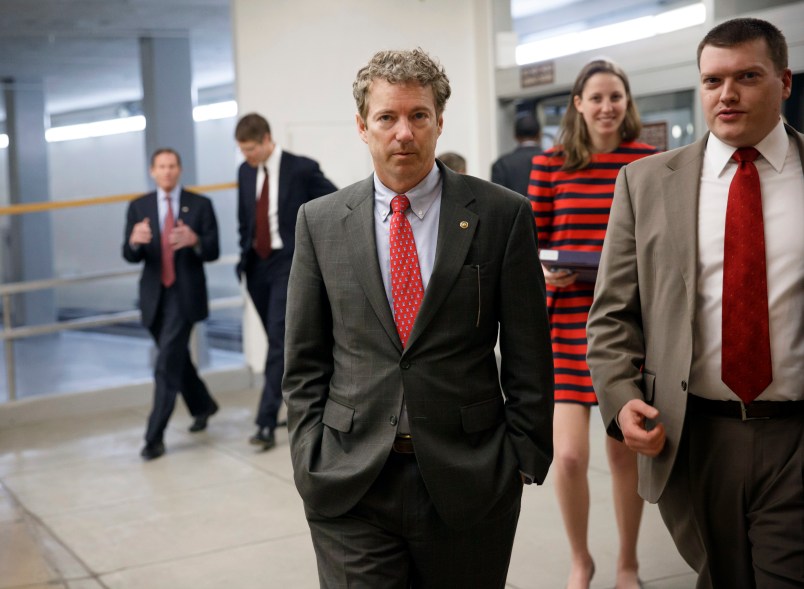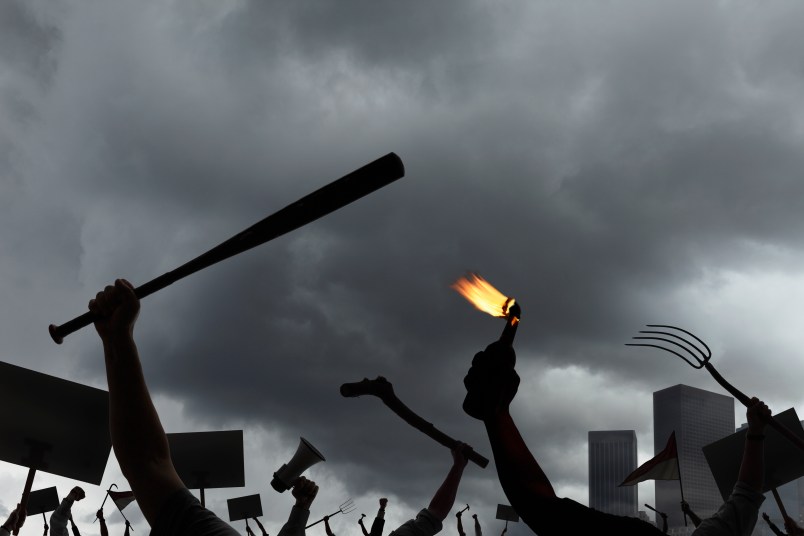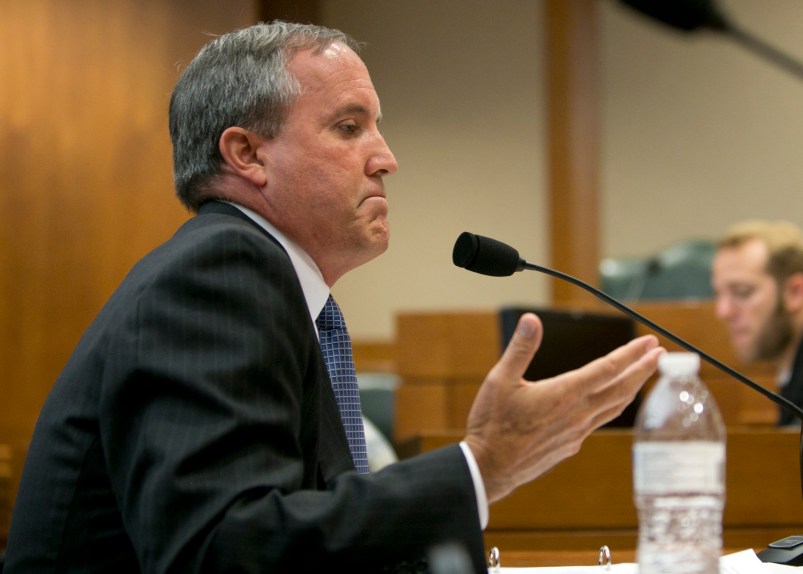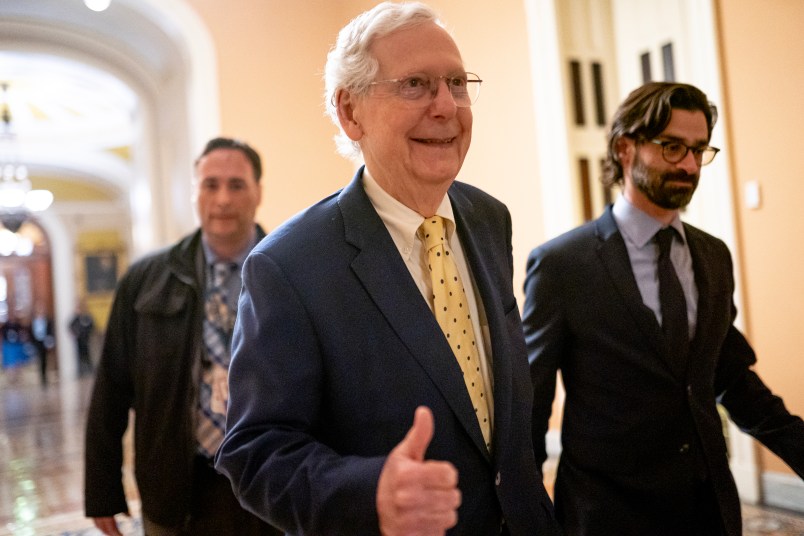As the “invisible primary” for 2016 gets underway, the most visible near-certain Republican candidate is the junior senator from Kentucky, Rand Paul. Aside from a consistent high ranking in early 2016 polls (he’s remained a steady presence near the top of all post-November-2012 surveys of Republicans, even as Marc Rubio and Chris Christie have risen and fallen), he’s received mostly favorable media attention, from his famous filibuster against CIA nominee John Brennan to his periodic “outreach” initiatives aimed at the young and minority voters among whom his party has been struggling.
He has also avoided much of the intra-party antagonism attracted by his rival Ted Cruz, in no small part because of his calm manner and good personal relationships with “Establishment Republicans” (particularly his Kentucky colleague the Senate Minority Leader, to whom he is offering valuable “constitutional conservative” cover in a potentially dangerous primary challenge). And he has a built-in national base and relatively high name ID thanks to his father’s various campaigns both as a Libertarian and as a Republican.
So what could go wrong, other than a bad gaffe or bad general election poll, or the emergence of a rival who could actually unite a fractious GOP?
The three-word answer is: the Ron Paul Revolution.
Most obviously, Ron Paul has not gone away, and continues to say things that discomfit his son. We saw this just last week when Paul the Elder published an op-ed at USA Today more-or-less accepting the Russian account of how things went south in Ukraine, and asking of the Russian acquisition of Crimea: “What’s the big deal?” This is not, suffice it to say, an acceptable point of view within the Republican Party at the moment.
Perhaps in anticipation of future embarrassing utterances by his father, Paul the Younger has let it be known he no longer intends to answer questions about the old man and his views. After all, he says, George W. Bush wasn’t constantly asked about his famous father, was he? Unfortunately for Rand’s theory, W.’s relationship with his family was in fact a big issue in his 2000 presidential campaign until such time as he established he was, in the words of conservative columnist Robert Novak, the “ideological heir of Ronald Reagan.” Besides, Bush 43 was moving from identification with a broader to a narrower political tradition as he checked off movement conservative litmus tests even as he prepared a general election campaign as a “compassionate conservative.”
The opposite direction — from a cultish libertarian movement to the GOP as a whole, and then to a general electorate — involves more rugged terrain. And the fact remains that Rand Paul’s candidate in the last two presidential cycles was Ron Paul.
Even if Rand somehow manages to silence or distance himself from his father, there remains the problem of the foot soldiers of the Revolution who are still important parts of his political operation. Rand Paul appears to suffer from the terrible political curse of loyalty to subordinates, as evidenced by the time he took to jettison neo-confederate staffer Jack Hunter last year. If he runs for president, there will be highly controversial Revolutionaries offering him dubious help in state after state. And he’s already got a problem in the very first state, where his PAC has just hired A.J. Spiker, fresh from an extraordinarily unsuccessful stint as Iowa party chair following a 2012 Paulite takeover of the state GOP that managed to unite Establishment Republicans and social conservatives in furious opposition to what one wag called Big Liberty.
The question of Rand Paul’s relationship with non-libertarian elements of the Tea Party movement he (along with rivals like Ted Cruz) will seek to claim as his base is a bit iffy as well, though it may be less of a problem than is assumed by observers who think of libertarians and the Christian Right as sworn enemies. Indeed, the “constitutional conservative” ideology of the Tea Party is in many respects a fusion of libertarian and Christian Right thinking, based on a conviction that strictly limited government was and should remain America’s birthright via natural or divine law (or both).
Aside from being simon-pure on the ultimate Christian Right litmus test issue of abortion, both Pauls have a long relationship with the theocratic U.S. Constitution Party, and a deep connection with the Christian homeschooling movement. But there is no question that to the extent Rand Paul plays up these aspects of his background, he will be sacrificing his much-discussed appeal to Millennial votes who may fear drones and hate NSA, but aren’t about to share a political bed with Christian Reconstructionists.
But ultimately, I’d say the biggest obstacle to Rand Paul’s effort to transcend his father’s Revolution will be the extraordinarily powerful connection between the GOP and the military-industrial complex. Paul has already managed to partially overcome his father’s unsavory reputation in pro-Israel circles, and has carefully avoided the old man’s inflammatory tendency to identify with foreign hostility to American hegemonism. He’s even found ways to participate in Obama-bashing over the president’s alleged “weakness” towards Russia and other adversaries.
But non-interventionism, accompanied by a lust for reducing expensive overseas commitments and getting rid of the hardware and manpower that goes with them, were very near the heart of the Ron Paul Revolution, second only to hostility to the Fed. Can the politically and financially powerful Dick Cheney wing of the GOP ever trust Ron Paul, or fail to back virtually any available rival? I don’t think so. And that may be an absolute bar to Rand Paul’s presidential ambitions.
Ed Kilgore is the principal blogger for Washington Monthly’s Political Animal blog, Managing Editor of The Democratic Strategist, and a Senior Fellow at theProgressive Policy Institute. Earlier he worked for three governors and a U.S. Senator. He can be followed on Twitter at @ed_kilgore.









